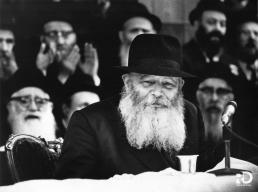Should Schools Teach in Yiddish?
We are a new community and are planning to open up a Chabad school. Some parents would prefer the classes to be taught in Yiddish, while others — whose children do not have a background in Yiddish — would like the classes to be taught in English. Has such a situation been addressed by the Rebbe? Rabbi Gershon Avtzon of Yeshivas Lubavitch – Cincinnati answers • Click to Read
Answer:
Before getting to the particulars of each individual scenario, it is important to establish a premise that there is an importance for our children to be able to understand and express themselves in Yiddish.
Why is Yiddish Important?
In addition to being able to be more fluent in the sichos of our Rebbeim, the Rebbe writes (Igros volume 10 page 24 #2987): “My father in law the Rebbe said that the most heartfelt things are expressed best in Yiddish, which is why towards the end of the holy Tanya, the Alter Rebbe uses two Yiddish words — ‘Gevald, Gevald!’ to express himself.”
In regard to Yiddish in schools, we find the following responses from the Rebbe to different scenarios:
1) A school that already began teaching in Yiddish, and wants to change so it will be acceptable to the general crowd: “Notwithstanding the reasoning that you mention in your letter, it is imperative that you continue the classes in Yiddish. At this time when the “Other side” (kelipah) is doing all in its power to be victorious, we need to show complete strength especially in aspects that are connected to education. In regard to matters of education, we do not know the long-lasting effect that such a change can have.” (Igros, Vol. 8, pp. 27 — #2271).
2) To a school that was considering switching from Hebrew to Yiddish in the middle of the school year, the Rebbe wrote: “It is self-understood that one should not change the language of instruction in the middle of a school year, unless absolutely necessary”. (Igros, Vol. 25 pp. 109 — #9465).
“Yiddish Values” Is the Job of the Parents
3) To parents, whose child spoke only English and were debating as to what language the child should be taught in, the Rebbe replied: “Being that both parents are fluent in Yiddish, a two-prong approach should be taken: You should speak Yiddish with the child at home so he can become accustomed to the language, and in school he should be instructed in the language he already understands to be able to gain more knowledge until he gains proficiency in Yiddish.” (Igros, Vol. 15 pp. 128 — #5444).
4) To residents of Kfar Chabad which were involved in a heated debate as to the instruction language of the local Talmud Torah, weather Hebrew or Yiddish, the Rebbe wrote the following: “It is my opinion that the main objective of the school is to teach the Torah and Mitzvos of Hashem and to instill Yiras Shamayim and Ahavas Hashem. Thus, the particular language that the lessons are being taught are secondary to achieving the main objective. As long as the language does not affect the Yiras Shamayim, these decisions should be made after discussion between the parents of the school, with each side explaining their reasoning, and the decision should be made by following the majority vote of the parent body.
The Rebbe adds: “I am still unsure if achieving the spiritual benefits of children speaking Yiddish is the responsibility of the school or of the parents and the atmosphere is the home.” (Likkutei Sichos, Vol. 22, pp. 411; Igros, Vol. 25 pp. 108-109 — # 9465).
Bi-Lingual Education
5) To an educator (Rabbi Hershel Fogelman, who was then the director of Achei Tmimim in Buffalo) who wanted to know what language the classes should be taught in the early 1940’s, the Rebbe responded that the classes should start off in English and slowly transition into Yiddish. The Rebbe gave advice on how to create the transition: (1) While the main lesson will be taught in English, the chazara (review) should be in Yiddish. This will also draw the attention of the students that already understood the material the first time it was taught. (2) To have set times in the schedule to learn the Yiddish language.” (Igros, Vol. 21, pp. 39 — #7787).
The Moshiach Connection:
In a special sicha dedicated to the first publishing in the Shiurim b’Sefer HaTanya which originally appeared in Yiddish (published in Likkutei Sichos Vol, 21 pp. 446 and as an introduction to the Yiddish Shiurim b’Sefer HaTanya), the Rebbe discussed the uniqueness of the Yiddish language. The gist of the talk was that although Gedolei Yisroel over many generations used foregin languages to teach Torah (Greek, Arabic, French, etc.), only Yiddish gained the status of a “Jewish language” as its name “Yiddish” implies. This goes to show how the foregin language was transformed and elevated to the point that it gained a certain status of Kedusha which is what Moshiach is all about — refining the sparks of Kedusha that fell into the world and making them holy.
The Rebbe goes on to point out how the Yiddish language is especially connected to the dissemination of Chassidus, as the Baal Shem Tov’s teachings were delivered in Yiddish and not in Lashon Hakodesh (see Tanya, Iggeres HaKodesh epistle 25) and so was the Tanya (which was originally advice said in Yechidus in Yiddish).
All the Rebbeim going forward delivered their ma’marim in Yiddish (although they wrote them in Hebrew) and the Frierdiker Rebbe even wrote and published some of his ma’amarim and sichos in Yiddish!
So, we see that Hafotzah Hamayanos, which is a crucial stage in preparing the world for Moshiach, was conducted primarily in Yiddish. Perhaps it’s because the whole “concept” of Yiddish — making a foreign language into a Jewish one — is very much the same “concept” of Moshiach and Chassidus.
May we soon come to the time when “I will transform all nations to a pure language, that all of them will call in the name of Hashem and worship Him of one accord.” (Tzefaniah 3:9)
“The Gemara states that with the future Redemption, all non-Jews will return to G-d with complete Teshuva, as the verse states: Rashi comments: “It is understood that there will be no difference among (G-d’s) servants. Israel and the nations will all serve G-d in the same manner, with all the mitzvot.”
However, the Rambam disagrees with this view. Although he writes that “all non-Jews will return and do Teshuva,” he does not interpret this to mean that they will convert to Judaism. The non-Jews will all commit to fulfilling the seven Noahide laws that were commanded to all of mankind.”
129
Never Miss An Update
Join ChabadInfo's News Roundup and alerts for the HOTTEST Chabad news and updates!
Related Posts:
Most Popular
New Videos
No items found.










































